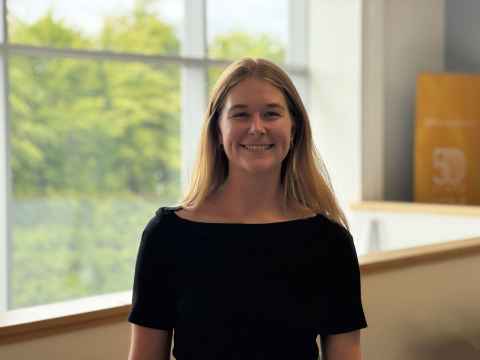Helena Copsey - Philosophy graduate
Curiosity led Helena to enrol in a Philosophy course – and it influenced her scientific research forever.

Key facts:
Career: Research Scientist at the Institute of Occupational Medicine, Edinburgh
Programme: Bachelor of Arts, majoring in Philosophy / Bachelor of Science conjoint
Scholarship: Top Achievers Scholarship
“I began my studies as a Science student but took a Philosophy paper in my second year out of curiosity. That paper, and the course director Dr Emily Parke, inspired and encouraged me to pursue a Bachelor of Arts in Philosophy alongside my Bachelor of Science.
“Studying such a diverse range of topics helped me to learn how to draw connections between disciplines and subject areas. Cross-topic analysis, critical thinking, and linking themes such as ethics, public health and logic have all been crucial in developing interdisciplinary and collaborative skills.
“In my role as a research scientist, I specialise in occupational and environmental health. I work within the research team on a variety of topics across a diverse range of occupations and potentially hazardous environments. I spend most of my time working on literature review and qualitative research, engaging with stakeholders and collaborating within the team to explore these areas.
“My Philosophy courses included the study of how to synthesise and distil complex information and ideas. This has been extremely useful in my current work, particularly for communicating technical information both within the organisation and externally. It has also been of great benefit with regards to patient and public involvement, the importance of which is increasingly acknowledged in the research field.
It is essential to understand the complex societal factors that underpin outcomes, especially in health research. Without my Bachelor of Arts, I wouldn’t have had the opportunity to develop this wider perspective as richly.
“One of the most useful skills I developed during my Arts degree was the ability to construct and analyse arguments from multiple perspectives. Initially, I found this transition of thinking and writing style challenging, as I began my studies exclusively in Science. The switch to incorporating philosophical styles of writing and developing my own arguments provided an extremely valuable skill in teaching me how to evaluate arguments critically and actually strengthened my ability to identify bias, which is critical in scientific research.
“My job gives me the opportunity to work across diverse research areas. Projects I’ve contributed to include firefighter exposure to hazardous chemicals; workplace mental health and stress, air quality, pesticide exposure, EU health and safety guidance, and microplastic exposure. I love exploring new topics, discussing and collaborating with experts and contributing to meaningful, current health research.
“I often take part in networking events to stay informed about current health concerns. Recently I had the privilege of attending a co-production workshop in North Carolina, which focused on microplastic pollution in waterways and explored how global environmental issues can be tackled at a local level. I very much enjoy these parts of my job as they highlight the interconnectedness of our work and the importance of creating networks of knowledge and collaboration to address today’s complex scientific problems.
“My main advice is to take advantage of the range of courses offered at the University. Enrolling in that initial Philosophy paper in my second year was the most impactful decision of my academic career. Attending talks, discussions, and in general exploring the topic areas that you’re interested in but may have not yet had the chance yet to explore is great and can lead down paths and offer opportunities you may have never expected.”